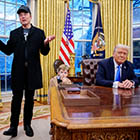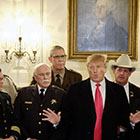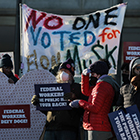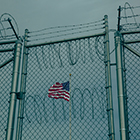
Know Your Enemy: Becoming Elon Musk, Part One
In the first of two episodes on Elon Musk, Matt and Sam explore the billionaire’s fraught adolescence and first years in Silicon Valley.


In the first of two episodes on Elon Musk, Matt and Sam explore the billionaire’s fraught adolescence and first years in Silicon Valley.

If the secretary of state can simply declare a legal permanent resident deportable based on their constitutionally protected activities, the First Amendment no longer applies to noncitizens.

There will surely be turf wars and palace intrigue within the administration, but there is little reason to think that its core figures will fracture in the pursuit of their basic goal: to break the twentieth-century state.

An interview with Jessica Pishko, author of The Highest Law in the Land.

Our documentary No Other Land won an Oscar, but the conditions it depicts are only getting worse.

Following the teachings of Murray Rothbard, Javier Milei wants to dismantle the state while also using it to consolidate his power.

A collection of Dissent’s writing on the union movement is out now. Get your copy today.

I’m Still Here defies the far right’s attempts to redeem Brazil’s military dictatorship. But it suggests a tidier closure to the regime’s disappearances than many real families have experienced.

A discussion between Brett Christophers and Adam Tooze, moderated by Kate Aronoff, about the climate crisis and the limits of capitalism.

Organized labor and its allies can and must do much more to respond to the crisis created by DOGE and the Trump administration.

Matt and Sam are joined by MSNBC’s Chris Hayes to discuss his new book The Sirens’ Call: How Attention Became the World’s Most Endangered Resource.

Red state governors and legislators are parroting Trump’s every move, promising to slash spending, and looking to tear down federal standards or guardrails that get in their way.

How do we achieve housing for all?

The Chinese government has rebuffed bold consumption stimulus policy. But boosting domestic household spending is precisely what the country needs to achieve healthy growth.

Guantánamo represents a place beyond the reach of morality and the law, where America’s most dangerous enemies can be thrown, never to be seen again.